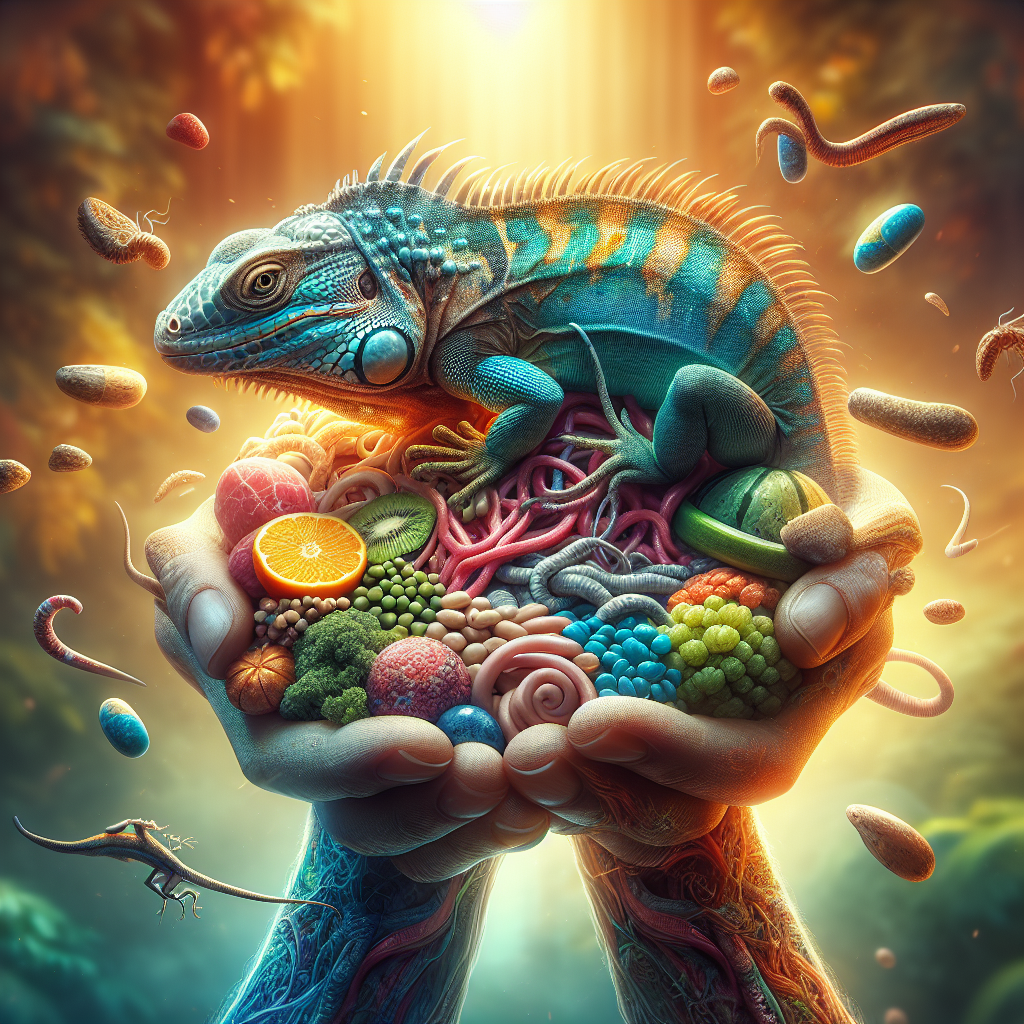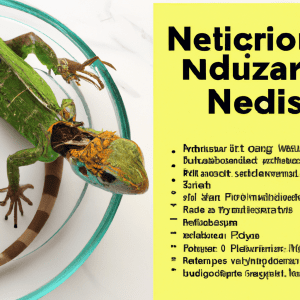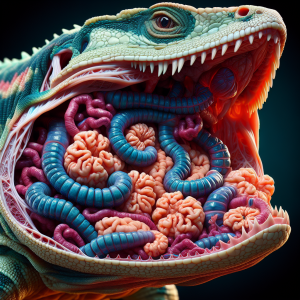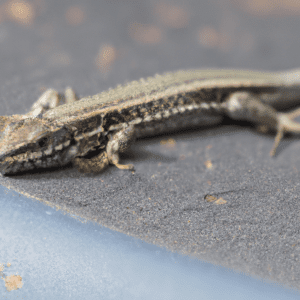Importance of a Balanced Diet for Lizard Health
Have you ever wondered why a balanced diet is so crucial for the health of our scaly friends? Well, let me tell you a little story about my cousin’s pet lizard, Spike.
You see, Spike used to be quite the picky eater. He would only feast on crickets and mealworms, turning his nose up at any fresh fruits or veggies offered to him. Despite his owner’s best efforts, Spike’s health began to decline. His scales lost their vibrant color, and he became lethargic.
It wasn’t until my cousin sought advice from a reptile nutritionist that she learned the importance of a balanced diet for lizards. The expert explained that just like us, lizards need a variety of nutrients to thrive. A diet solely consisting of insects can lead to deficiencies and health issues in the long run.
By gradually introducing a mix of insects, leafy greens, and fruits into Spike’s diet, his health started to improve. His energy levels increased, his colors became more vibrant, and he even seemed happier overall. It was a remarkable transformation that highlighted the power of proper nutrition for our scaly companions.
This anecdote perfectly illustrates the significance of understanding the nutritional needs of lizards. A balanced diet not only ensures their physical well-being but also plays a crucial role in their mental and emotional health. So, the next time you’re feeding your lizard, remember to offer a diverse range of foods to keep them happy and healthy. After all, a well-fed lizard is a happy lizard!
Understanding Nutritional Needs of Lizards
Have you ever thought about what exactly your pet lizard needs in terms of nutrition? It’s fascinating to learn about the specific dietary requirements of these unique creatures. Imagine tailoring a menu for your lizard just like you would for yourself – a little bit of this, a dash of that, all to keep them healthy and happy.
When delving into the nutritional needs of lizards, it’s like uncovering a hidden treasure trove of information. Did you know that different species of lizards have varying dietary preferences and requirements? It’s intriguing to explore how their natural habits and environments influence what they should eat. For instance, herbivorous lizards like iguanas need a diet rich in greens and vegetables, while insectivorous species such as bearded dragons thrive on a diet of insects.
Understanding these nuances is crucial for providing the best care for your scaly friend. Just like us, lizards need a balanced diet to stay healthy and vibrant. As we delve deeper into the world of lizard nutrition, we begin to appreciate the intricacies of their dietary needs. From the importance of calcium and vitamin D for bone health to the right balance of protein and carbohydrates, every component plays a vital role in their overall well-being.
Imagine the satisfaction of knowing that you’re providing your lizard with everything they need to thrive. It’s like being a master chef, creating a culinary masterpiece tailored to your pet’s needs. Plus, seeing your lizard happily munching away on their specially curated meals is a rewarding experience in itself.
As we navigate the realm of lizard nutrition, we’ll uncover practical tips and advice to ensure that your scaly companion receives the best possible care. So, let’s embark on this journey together and unlock the secrets to a healthy and happy lizard through a well-balanced diet.
Selecting the Right Foods for a Balanced Diet
Have you ever wondered about the best foods to feed your lizard for a balanced diet? It’s like creating a gourmet meal plan for your scaly friend! When it comes to selecting the right foods for your lizard, there are a few key things to keep in mind.
First off, think about the natural diet of your lizard species. For example, if you have a herbivorous lizard, you’ll want to focus on providing fresh fruits and vegetables. On the other hand, carnivorous lizards will need a diet rich in insects or small prey. It’s all about mimicking their natural eating habits to ensure they get the nutrients they need.
Now, here’s an interesting fact for you: did you know that some lizards are picky eaters? Just like humans, lizards can have preferences when it comes to food. So, don’t be surprised if your lizard turns up its nose at certain items. Experiment with different foods to see what your lizard enjoys and adjust their diet accordingly.
When selecting foods for your lizard, make sure to choose high-quality options that are safe and nutritious. Avoid feeding them insects caught in the wild, as these could carry pesticides or parasites. Opt for commercially bred insects or fruits and vegetables from a trusted source to keep your lizard healthy and happy.
Another important tip is to vary your lizard’s diet to ensure they get a wide range of nutrients. Just like us, lizards need a balanced diet to thrive. Mix up their meals with different types of insects, vegetables, and fruits to provide a well-rounded nutrition profile.
By paying attention to your lizard’s dietary needs and preferences, you can create a menu that keeps them healthy and satisfied. So, next time you’re planning your lizard’s meals, think of it as preparing a special feast tailored just for them!
Feeding Schedule and Portions for Lizards
Feeding Schedule and Portions for Lizards is a crucial aspect of maintaining their health and happiness. Picture this: you set a beautiful plate of fresh fruit in front of your lizard, expecting it to gobble it all up in one go. But wait, slow down there! Just like we humans have portion control, lizards too need the right amount of food at the right time.
Let’s delve into this a bit further. Imagine if you were to eat your entire day’s meals in one sitting – not the best idea, right? The same goes for our scaly friends. Establishing a regular feeding schedule is essential for their well-being. Lizards thrive on routine, so try to feed them at the same time each day to regulate their metabolism and keep them healthy.
Now, let me share a helpful tip with you. When it comes to portion sizes, it’s important not to overfeed your lizard. While it’s tempting to shower them with treats, moderation is key. A good rule of thumb is to offer food portions that are no larger than the size of their head. This helps prevent overeating and ensures they receive the right amount of nutrients without becoming overweight.
Think about it this way – how would you feel if you were served a plate that was too big for you to finish? Lizards experience discomfort and health issues when they consume more than they need. By monitoring their portions and sticking to a consistent feeding schedule, you’re not only promoting their physical health but also their mental well-being.
So, remember, when it comes to feeding your lizard, balance is key. Establish a routine, watch their portions, and enjoy the satisfaction of knowing you’re taking good care of your scaled companion.
Supplements for Optimal Health
Have you ever wondered how supplements can impact the health of your pet lizard? It’s actually quite fascinating. I remember when I first started researching about lizard nutrition, I was surprised to learn about the role of supplements in their diet.
Lizards, like many other pets, require a variety of nutrients to thrive. While a balanced diet composed of fresh foods is essential, sometimes it may not provide all the necessary vitamins and minerals. That’s where supplements come into play. These little additions can make a big difference in maintaining your lizard’s overall health and well-being.
One interesting fact about supplements for lizards is that they can vary depending on the species. Some lizards may require specific supplements to meet their unique nutritional needs. For example, calcium and vitamin D3 are crucial for many lizard species to prevent metabolic bone disease. Understanding the specific requirements of your lizard species is key to selecting the right supplements for their diet.
When incorporating supplements into your lizard’s diet, it’s important to do so in moderation. Too much of a certain supplement can be just as harmful as a deficiency. Consulting with a veterinarian or reptile nutrition specialist can help you determine the appropriate dosage and frequency for your lizard’s needs.
It’s a common misconception that a balanced diet alone can fulfill all of a lizard’s nutritional requirements. While fresh vegetables, fruits, and insects are important components of their diet, supplements play a vital role in ensuring that your lizard receives all the essential nutrients they need to stay healthy.
So, next time you’re preparing your lizard’s meal, consider the role that supplements can play in promoting their health. By providing a well-rounded diet that includes the necessary supplements, you can help your lizard thrive and lead a long, healthy life.
Monitoring and Adjusting Diet as Needed
Have you ever felt like you’re nailing your lizard’s diet, only to see some signs that maybe you’re not quite hitting the mark? That’s where monitoring and adjusting their diet comes into play. It’s like fine-tuning a musical instrument – a little tweak here and there can make all the difference in your lizard’s health and well-being.
Let me share a personal anecdote with you. I remember when I first got my bearded dragon, I was so excited to feed him all the best foods I could find. But after a while, I noticed that he seemed a bit sluggish and his skin wasn’t looking as vibrant as usual. That’s when I realized I needed to pay closer attention to his diet and make some adjustments.
Monitoring your lizard’s diet involves keeping an eye on their eating habits, physical appearance, and overall behavior. Are they eating enthusiastically or picking at their food? Do they look alert and active, or are they lethargic? These are all clues that can help you understand if their diet is on track.
If you notice any changes in your lizard’s health or behavior, it might be time to adjust their diet. Maybe they need more of a certain nutrient, or perhaps they’re not getting enough hydration. Small changes like adding more leafy greens or offering a variety of insects can make a big difference in their overall health.
Remember, every lizard is unique, so what works for one may not work for another. It’s all about finding the right balance that suits your pet’s individual needs. By staying observant and proactive in monitoring and adjusting their diet, you can ensure that your lizard stays happy and healthy for years to come.
Common Mistakes to Avoid in Lizard Nutrition
You know, when it comes to feeding your pet lizard, there are some common mistakes that many people make without even realizing it. Let me share a personal anecdote with you – I once had a friend who thought that giving his lizard only one type of food was enough to keep it healthy. Well, let’s just say that didn’t end well for the poor lizard.
It’s crucial to understand that lizards, like all animals, need a varied diet to thrive. That’s where the controversy often arises – some people believe that feeding lizards only one type of food is sufficient, but that’s far from the truth. Lizards require a mix of insects, vegetables, and even fruits to meet all their nutritional needs.
So, here’s a practical tip for you: when it comes to feeding your lizard, diversity is key. Try to incorporate a variety of foods into their diet to ensure they are getting all the necessary nutrients. Insects like crickets and mealworms are great sources of protein, while dark leafy greens and vegetables provide essential vitamins and minerals.
Now, you might be wondering, why does it matter so much? Well, the broader significance of providing a balanced diet for your lizard is not just about keeping them healthy – it’s also about promoting their overall well-being and longevity. Just like us, lizards need proper nutrition to thrive and live a happy life.
So, next time you’re feeding your lizard, remember to mix things up and offer them a well-rounded diet. Your scaly friend will thank you for it with their vibrant colors, energetic behavior, and overall health. And who knows, maybe they’ll even show their appreciation with a little lizard dance – now wouldn’t that be a sight to see!
Benefits of a Balanced Diet on Lizard Health
Have you ever wondered about the magical benefits a well-balanced diet can bring to your lizard friend? Let me tell you, it’s truly remarkable! Picture this: your lizard basking under a warm light, content and vibrant, all thanks to the power of good nutrition.
Imagine this scenario: you’ve been diligently feeding your lizard a variety of nutritious foods, ensuring they receive all the essential nutrients they need. Then, one day, you notice something extraordinary – your lizard’s scales are gleaming with a newfound radiance, and their energy levels seem to have skyrocketed. That’s the beauty of a balanced diet – it works wonders for their overall health and well-being.
Now, here’s an interesting fact to ponder: did you know that a balanced diet not only impacts your lizard’s physical health but also plays a crucial role in their mental well-being? Just like us, lizards thrive when they are properly nourished, leading to a happier and more active lifestyle. It’s fascinating to witness how something as simple as the right diet can make such a profound difference.
So, the next time you’re crafting your lizard’s meal plan, remember this: variety is key. Incorporating a diverse range of foods ensures that your scaly companion receives all the necessary vitamins and minerals for optimal health. Don’t be afraid to experiment with different fruits, vegetables, and protein sources to keep things exciting and nutritious for your little friend.
In the grand scheme of things, a balanced diet for your lizard goes beyond just physical health – it’s a way to show your love and care for them. By providing them with the best possible nutrition, you’re contributing to their longevity and happiness. And let’s face it, a happy lizard equals a happy lizard parent!
Expert Tips for Maintaining a Healthy Lizard Diet
Have you ever wondered how to ensure your pet lizard gets the best nutrition possible for a long and healthy life? Well, let me share some expert tips for maintaining a healthy lizard diet that will have your scaly friend thriving in no time.
One practical tip related to lizard nutrition is to ensure that your pet is getting a variety of foods to meet all its nutritional needs. Just like us, lizards require a balanced diet to stay healthy. This means offering a mix of insects, leafy greens, fruits, and even the occasional treat to keep things interesting.
It’s essential to pay attention to the specific dietary requirements of your lizard species. For example, herbivorous lizards like iguanas will need more greens and vegetables in their diet, while insectivores like geckos will thrive on a diet rich in insects such as crickets and mealworms. By understanding your lizard’s natural diet in the wild, you can better replicate those food choices in captivity.
To make sure your lizard is getting all the necessary nutrients, consider adding supplements to their diet. Calcium and vitamin D3 supplements are particularly important for many lizard species to prevent deficiencies and maintain strong bones and overall health. However, it’s crucial to consult with a vet or reptile nutrition expert before adding any supplements to your pet’s diet to ensure you are providing the right amounts.
By following these expert tips and guidelines for maintaining a healthy lizard diet, you can help your scaly companion lead a happy and healthy life. Remember, a well-fed lizard is a happy lizard!
Promoting Longevity and Well-being through Nutrition
“Maintaining a healthy diet for your pet lizard is crucial for their overall well-being. Let me share with you some tips on how to ensure your scaly friend stays in top shape through proper nutrition.
One of the key things to keep in mind is understanding the nutritional needs of lizards. Just like us, they require a variety of nutrients to thrive. From proteins to vitamins and minerals, each component plays a vital role in their health. It’s like putting together a puzzle, making sure all the pieces fit perfectly to create a picture of vitality and longevity for your lizard.
Choosing the right foods for your lizard can be a fun adventure. Imagine strolling through the aisles of a reptile supermarket, carefully selecting the best options for your scaly companion. It’s like being a chef preparing a gourmet meal, but instead of people, your audience is a curious lizard eagerly awaiting their next culinary delight.
Now, when it comes to establishing a feeding schedule, consistency is key. Think of it as setting up a routine for your lizard, ensuring they receive their meals at the same time each day. It’s like clockwork, ticking away to keep your pet healthy and satisfied.
Supplements can also play a crucial role in enhancing your lizard’s diet. Just like how we take vitamins to boost our health, supplements can provide that extra support for your scaly friend. It’s like giving them a little boost, a secret weapon to help them thrive even more.
As you embark on this journey of providing a balanced diet for your lizard, remember that each step you take contributes to their well-being. It’s a rewarding experience to see your pet flourish under your care, knowing that you’re making a positive impact on their life through proper nutrition.
So, let’s dive into the world of lizard nutrition together and ensure that our scaly friends live their best lives with a balanced diet tailored just for them.”




